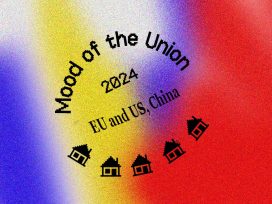Young voters are getting more engaged in European politics, but this growth starts from a very low point. Radicalization is increasing, and most people connect with politics emotionally and through communities. The EU holds vast power and potential, but how can it engage young people ? Standard Time’s Europe Day episode premiering today at 5 PM CET.
May 9th marks the anniversary of the 1950 Schuman Declaration, which proposed the creation of a European Coal and Steel Community that would merge economic interests. It was the first step towards unifying great powers of Europe.
In the aftermath of the Second World War, the prospect of peace and unity brought countries together, eventually birthing the European Parliament in 1958. Since then, the EU has grown exponentially, geographically and in institutional maturity. For at least a decade though, it has been witnessing a steady rise in right-wing populism, social fragmentation, economic crises, and Euroscepticism.
Find the show in podcast format on the Cultural Broadcasting Archive, or on any podcast aggregator by the name Standard Time talk show.
One core problem is that the population of the member states tends to engage with the EU through their local politics. European Parliamentary elections tend to have lower attendance than national and local elections do, and this is due to the reason that for most citizens, EU elections just feel too far removed from their daily lives, and are considered secondary.
The EU’s reputation seems to have improved somewhat since the last 2019 elections. In comparison to 2014, there was a 50% increase in young voters, for example. Despite this increase, many are still disengaged, with some not even having any idea when voting dates are in their respective countries.
With technologization, the nature of voting has also drastically changed. Over half of the EU’s youth rely on social media for information, which makes them susceptible to digital propaganda. The far-right has discovered TikTok, for example, and is now using it to gain votes.
Democratic participation is one of the highlight topics of the Maastricht Debates, where the top candidates of European parties address three priorities chosen by Europeans. The two other themes are Climate Change and Foreign Policy, which we will also be covering on this show in the coming months, as the European Parliamentary Elections unfold.
Today’s guests
Ivana Dragičević is an award-winning journalist, author, and founder of Europe Future Center. She is the Editor-at-large on N1 Television, an exclusive CNN affiliate for the Adria-Balkans Region. Ivana is the author of multiple documentaries, including the series Voters 2024 and Future of Europe in cooperation with the European Parliament, as well as the two acclaimed books – (Un)equals (2018), on global order and inequality, and (Un)secured, on the future of security in the world (2023.)
André Wilkens is the director of the European Cultural Foundation in Amsterdam. He is also the Board Chair of Tactical Tech Cooperative, the co-founder of the Initiative Offene Gesellschaft, and a founding member of the European Council on Foreign Relations. He works on European and international affairs, equality, climate change, and a more human digital world. He is the author of two books on Europe and Digitalization.
Michael Zeller is an Assistant Professor in comparative politics at the Ludwig-Maximilians-University in Munich. He earned his PhD from the Central European University, and worked on the project: ‘Building Resilience against Violent Extremism and Polarisation’ (BRaVE). He is currently a fellow at the Institute for Human Sciences in Vienna, researching Right Wing Extremism (RWE) in Europe. He is a member of the Radicalisation Awareness Network Policy Support (RAN PS), and the European Research Community on Radicalisation (ERCOR) Researchers’ Directory.
We meet with them at the IWM Library
Creative team
Réka Kinga Papp, editor-in-chief
Merve Akyel, art director
Szilvia Pintér, producer
Zsófia Gabriella Papp, digita producer
Salma Shaka, writer-editor
Priyanka Hutschenreiter, project assistant
Management
Hermann Riessner, managing director
Judit Csikós, project manager
Csilla Nagyné Kardos, office administration
OKTO Crew
Senad Hergić, producer
Leah Hochedlinger, video recording
Marlena Stolze, video recording
Clemens Schmiedbauer, video recording
Richard Brusek, sound recording
Postproduction
Milan Golovics, dialogue editor
Nóra Ruszkai, video editor
István Nagy, post production
Art
Victor Maria Lima, animation
Cornelia Frischauf, theme music
Captions and subtitles
Julia Sobota, Daniela Univazo, Mars Zaslavsky, Marta Ferdebar, Olena Yermakova, Farah Ayyash
Hosted by
The Library of the Institute for Human Sciences.
Related reads
Focal point: Mood of the union, Eurozine.
Podcast: No turning a blind eye.
Sources
David vs. Goliath of voter turnout: Why is the participation in EU elections so low? by Florian Gasser, Eurac.
European elections: How engaged are young people? by Ilaria Federico, Euronews.
Your guide to the 2024 European election in 9 charts, Politico.
Europe’s far right uses TikTok to win youth vote by Clothlide Goujard, Elisa Braun, and Mark Scott, Politico.
Disclosure
This talk show is a Display Europe production: a ground-breaking media platform anchored in public values.

This programme is co-funded by the Creative Europe Programme of the European Union and the European Cultural Foundation.
Importantly, the views and opinions expressed here are those of the authors and speakers only and do not necessarily reflect those of the European Union or the European Education and Culture Executive Agency (EACEA). Neither the European Union nor the EACEA can be held responsible for them.

Published 9 May 2024
Original in English
First published by Eurozine / Display Europe / OKTO TV
© Standard Time / Eurozine / Display Europe / OKTO TV
PDF/PRINTNewsletter
Subscribe to know what’s worth thinking about.
Related Articles

Since the collapse of Novi Sad’s train station in November, student-led protests have erupted across Serbia, inspiring a nationwide movement against corruption.

After six months of protests, there are grounds for hope that the tide is turning in favour of the Serbian student movement: first, the unification of the opposition around the movement’s demand for new elections; second, the emergence of a strategic alliance between the students and the EU.




